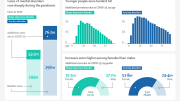
The study undermines the theory that depressed people are more realistic.
The study found that the theory of “depressive realism” is not replicable.
Are unhappy individuals just more realistic in their assessments of how much control they really have over their life, whilst others see the world through rose-colored lenses and falsely believe they have more control than they actually do?
That is the general idea of the “depressive realism” theory, which has been prevalent in science and popular culture for more than forty years.
The issue is that it’s just untrue, according to a recent study.
“It’s an idea that exerts enough appeal that lots of people seem to believe it, but the evidence just isn’t there to sustain it,” says Professor Don Moore, the Lorraine Tyson Mitchell Chair in Leadership and Communication at the University of California Berkeley’s Haas School of Business and co-author of the study, in press at the journal Collabra:Psychology. “The good news is you don’t have to be depressed to understand how much control you have.”
Depressive realism
The idea of depressive realism originated from a 1979 experiment in which college students were asked to guess how much influence they had over whether a light would turn green when a button was pressed. The original study indicated that depressed students were better at recognizing when they had no influence over the lights, but non-depressed students tended to overestimate their amount of control.
As part of a larger effort to rebuild confidence in scientific research, which is heavily ingrained in both the fabric of the scientific community and wider society, Moore and his colleagues set out to attempt to replicate those findings. Researchers are reviewing foundational research in order to strengthen the most fundamental scientific principles: Can the research, and its findings, be replicated?
Why test the theory of depressive realism in particular? Its decades-long infusion into science, culture, and even potential mental health treatment policy makes it important, Moore says. The original study, for instance, was cited more than 2,000 times in subsequent studies or research, according to Google Scholar.
“At the top of the list of reasons why we ought to revisit this particular article is its widespread acceptance in both the scholarly and popular literature,” says Moore, who studies overconfidence, confidence, and decision-making. “That means a lot of people are building theories or policies premised on this effect being true. If it’s not, it’s really important to establish that.”
Replicating the original study
Moore co-authored the study with the University of California Berkeley psychology professor Sheri Johnson and former undergraduate student researcher Karin Garrett, BA 21, along with University of Miami doctoral student Amelia Dev, BA 17.
The authors studied two groups of participants, whom they screened for depression via a questionnaire. The first group of 248 participants came from Amazon’s Mechanical Turk, an online service that provides paid survey-takers and study participants from a range of backgrounds, in this case all over 18 years old. The second group was made up of 134 college students who participated in return for college credit.
The researchers added or used more modern and robust measurements for the study. For example, they added a mechanism to measure bias, and experimentally varied the amount of control participants actually had.
Participants performed a task similar to that in the 1979 study. In 40 rounds, each chose whether to press a button, after which a lightbulb or a black box appeared. Each was told to figure out whether pushing (or not pushing) the button impacted whether the light came on. After the rounds, each reported how much control they had over the light.
Both the online groups and college student groups were split into three experimental conditions. Each condition experienced different relationships between the button and the light during the 40 rounds. The participants in the first two conditions had no actual control over the light’s appearance, yet saw it illuminate one-quarter or three-quarters of the time, respectively. Participants in the third condition had some control, seeing the light three-quarters of the time after pushing the button.
The researchers were unable to replicate the original study’s results. In fact, people in the online group with a higher level of depression overestimated their control—a direct contradiction to the original study. That finding may be driven by anxiety rather than depression, the researchers note, an observation Moore says merits further study.
In the college student group, depression levels had little impact on their view of their control, the authors found.
Researchers also tested for overconfidence. Study participants were asked to estimate their scores on an intelligence test. Depression had no impact there, either.
Results undermine the theory
The results, Moore says, undermined his belief in depressive realism.
“The study does not suggest that there are benefits to being depressed, so no one should seek depression as a cure to their cognitive biases,” Moore says.
Imagine, for example, a manager hiring someone who is depressed because they believe—based on the original study—that the person is less likely to be overconfident and will have better judgment. That would be a mistake, Moore says.
While depression may not improve judgment, the issue of how to accurately gauge our level of control in various situations has broader implications throughout life, Moore says.
“We live with a great deal of uncertainty about how much control we have—over our careers, our health, our body weight, our friendships, or our happiness,” says Moore. “What actions can we take that really matter? If we want to make good choices in life, it’s very helpful to know what we control and what we don’t.”
Reference: “Sadder ≠ Wiser: Depressive Realism is not Robust to Replication” by Amelia Dev, Don A. Moore, Sheri Johnson and Karin Garrett, 12 October 2022, Collabra:Psychology.
DOI: 10.31234/osf.io/xq24r









Be the first to comment on "No, Depressed People Aren’t Just More Realistic"